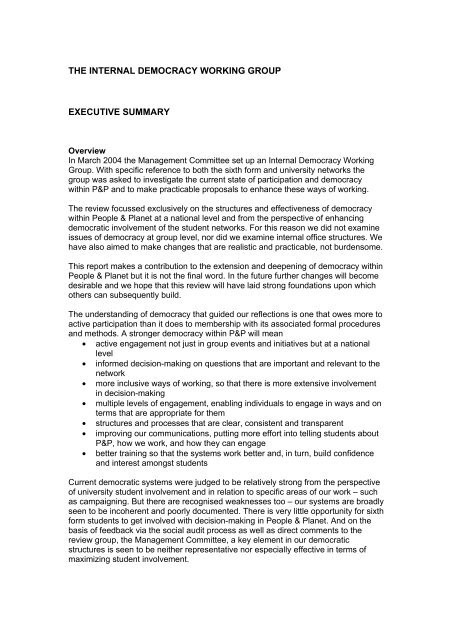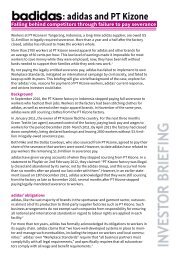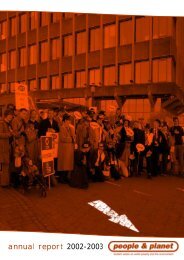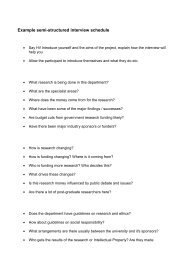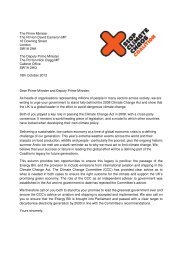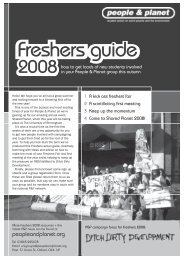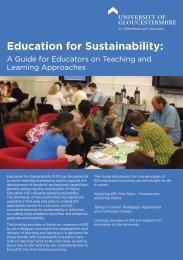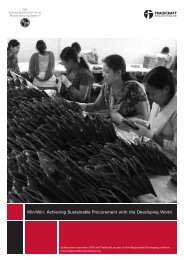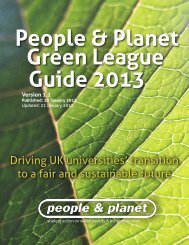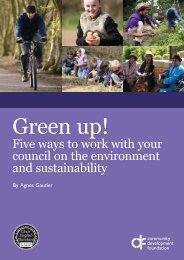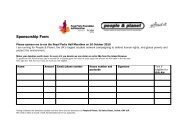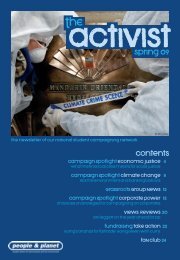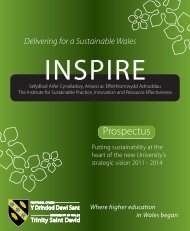EXECUTIVE SUMMARY - People & Planet
EXECUTIVE SUMMARY - People & Planet
EXECUTIVE SUMMARY - People & Planet
You also want an ePaper? Increase the reach of your titles
YUMPU automatically turns print PDFs into web optimized ePapers that Google loves.
THE INTERNAL DEMOCRACY WORKING GROUP<br />
<strong>EXECUTIVE</strong> <strong>SUMMARY</strong><br />
Overview<br />
In March 2004 the Management Committee set up an Internal Democracy Working<br />
Group. With specific reference to both the sixth form and university networks the<br />
group was asked to investigate the current state of participation and democracy<br />
within P&P and to make practicable proposals to enhance these ways of working.<br />
The review focussed exclusively on the structures and effectiveness of democracy<br />
within <strong>People</strong> & <strong>Planet</strong> at a national level and from the perspective of enhancing<br />
democratic involvement of the student networks. For this reason we did not examine<br />
issues of democracy at group level, nor did we examine internal office structures. We<br />
have also aimed to make changes that are realistic and practicable, not burdensome.<br />
This report makes a contribution to the extension and deepening of democracy within<br />
<strong>People</strong> & <strong>Planet</strong> but it is not the final word. In the future further changes will become<br />
desirable and we hope that this review will have laid strong foundations upon which<br />
others can subsequently build.<br />
The understanding of democracy that guided our reflections is one that owes more to<br />
active participation than it does to membership with its associated formal procedures<br />
and methods. A stronger democracy within P&P will mean<br />
• active engagement not just in group events and initiatives but at a national<br />
level<br />
• informed decision-making on questions that are important and relevant to the<br />
network<br />
• more inclusive ways of working, so that there is more extensive involvement<br />
in decision-making<br />
• multiple levels of engagement, enabling individuals to engage in ways and on<br />
terms that are appropriate for them<br />
• structures and processes that are clear, consistent and transparent<br />
• improving our communications, putting more effort into telling students about<br />
P&P, how we work, and how they can engage<br />
• better training so that the systems work better and, in turn, build confidence<br />
and interest amongst students<br />
Current democratic systems were judged to be relatively strong from the perspective<br />
of university student involvement and in relation to specific areas of our work – such<br />
as campaigning. But there are recognised weaknesses too – our systems are broadly<br />
seen to be incoherent and poorly documented. There is very little opportunity for sixth<br />
form students to get involved with decision-making in <strong>People</strong> & <strong>Planet</strong>. And on the<br />
basis of feedback via the social audit process as well as direct comments to the<br />
review group, the Management Committee, a key element in our democratic<br />
structures is seen to be neither representative nor especially effective in terms of<br />
maximizing student involvement.
Working Group Proposals<br />
The Management Committee<br />
The Management Committee (MC), the key decision-making body within <strong>People</strong> &<br />
<strong>Planet</strong>, is responsible for the effective governance of all aspects of P&P’s work,<br />
though it may delegate specific decisions to other components of our decision<br />
-making system such as the Management Team, the Director or the Forum.<br />
Currently the MC comprises 12 people and the democratic involvement of the<br />
network hinges on two principal characteristics. Firstly, it is made up of 50% students<br />
and 50% non-students and, secondly, the student members are elected by the<br />
network.<br />
The tenure of MC membership is different for the two categories of members.<br />
Student members are elected for one year and must then stand down. Non-student<br />
members do not have a designated term – hence they are sometimes called<br />
‘permanent’. The current scale of imbalance between the two categories is widely<br />
considered to be disproportionate. Other weaknesses of the current system are:<br />
• there is no opportunity for sixth form students to stand for election<br />
• the term of office – one year – is too short<br />
• the current structure and election process blurs two quite different roles - that<br />
of regional rep. with its focus on supporting the network and that of MC<br />
member with its emphasis on governance and strategy<br />
• the election process is unclear, undocumented and likely to restrict the range<br />
of candidates and the size of the ‘electorate’.<br />
• there is no mechanism to replace a student who is unable or unwilling to<br />
continue on the MC<br />
Proposals<br />
1.We retain the current 50/50 balance between student and non-student members of<br />
the MC. A student member may be either a sixth form or a university student.<br />
2.We separate the role of regional rep from that of MC member.<br />
3.The student members of the MC should be elected directly by the network. Any<br />
student can stand for election irrespective of whether they are a university or sixth<br />
form student.<br />
4.Membership of the MC for both students and non-students should be for a<br />
designated period of tenure. Two years as the preferred term for students and a<br />
renewable term of three years for non-students.<br />
5.If a student member wishes to stand down after one year, replacement is by<br />
election. If a student wants to withdraw during their period of tenure, the MC can coopt<br />
a replacement student member.<br />
6.Changes in the composition of the MC should be communicated promptly so that<br />
the network feels up-to-date and informed.<br />
7.Designating one non-student member of the MC to be the first point of contact for<br />
student members for information and advice.<br />
Campaigns Decisions<br />
There is broad agreement that the student network should be more involved with<br />
campaign design so as to<br />
•Make our campaigns more attractive to students and thus more likely to be run<br />
•make campaigns more effective<br />
•ensure that a core group of students understand and are excited by the campaign<br />
•increase understanding of how to design and execute campaigns
It is proposed that we aim to create a campaign reference group for each of the<br />
campaign themes. Groups would be made up of Uni students, 6 th form students and<br />
staff. Their role would be making decisions on campaign strategy, actions and<br />
materials and shortlisting campaign options for the Forum. The review team<br />
considered three ways in which these reference groups could work and recommends<br />
initial trialling of an approach that rests on intense work with a few groups to take<br />
decisions on the materials and actions.<br />
With reference to decisions on new campaigns, the MC has historically devolved<br />
decision-making to a network event every spring (the Forum). We propose to keep<br />
this arrangement and the principal changes that this report recommends are primarily<br />
designed to formalise the existing process and to clarify the role of the Management<br />
Committee, the Management Team and the Campaigns team.<br />
The key recommendation is the introduction of a more thorough and clearer process<br />
by which groups will be notified of the opportunity to make suggestions for which<br />
campaigns <strong>People</strong> & <strong>Planet</strong> should run. Members of Campaign Reference groups<br />
and Campaigns Team staff will read all proposals and short list a minimum of 2<br />
campaign options per decision. This will ensure that a clear decision is offered. Short<br />
listing will be based on the criteria set out in the prevailing Campaign Strategy paper.<br />
At the Forum, delegates will choose one new strand/ theme to replace one that is<br />
being discontinued. Participants are expected to bear in mind the views of their<br />
groups but will make their own decision. Consensus will be aimed for, but there is no<br />
assumption that it must be reached.<br />
Fundraising<br />
Although fundraising is critically important to <strong>People</strong> & <strong>Planet</strong> there has been little<br />
opportunity for the network to be involved in this aspect of our work. Currently,<br />
decisions about P&P ‘s income and expenditure are taken primarily by staff.<br />
For its income, <strong>People</strong> & <strong>Planet</strong> is heavily dependent on grants from external<br />
organisations. Such dependency militates against democratic involvement because a<br />
grants-based income structure emphasises the relationship between the P&P<br />
support office and the external donor with decisions being taken to meet donor’s<br />
deadlines. Compliance with these deadlines and associated conditions are rarely<br />
conducive to extensive involvement of the network.<br />
Nevertheless we acknowledge (and encourage) the interest of the network in the<br />
question of where <strong>People</strong> & <strong>Planet</strong> gets its money from and, in particular, in our links<br />
with corporate donors. We have started to discuss these ideas with regional reps and<br />
a small ‘fundraising reference group’. We believe there is an ongoing role for such a<br />
group and propose that the Management Team should have the authority to set up<br />
ad hoc working groups (such as the current one on fundraising) on issues that are of<br />
organisational relevance as well as providing opportunities for regional reps. to be<br />
consulted on the policies which will guide our engagement with the corporate sector.<br />
Projects outside of our regular programme of work<br />
P&P has done some amazing work in this category, including the creation of Fair<br />
Share (on the basis of our earlier Ethics for USS campaign) and the Ethical Careers<br />
Service. Both of these examples have made a big impact, but do not fall into the<br />
general “students campaigning” remit of P&P. Similarly, there are areas of resource<br />
allocation which fall naturally outside the democratic structures, such as salaries,<br />
staff training budgets etc.
To bring these kind of initiatives into our formal structures we propose a formalisation<br />
of what already happens in practice: new initiatives should be approved by the<br />
Management Committee.<br />
Student Network Roles<br />
As key stakeholders, we want to create a diversity of roles for both university and<br />
sixth form students to have democratic input to our work. Currently we have<br />
mechanisms for university students to get involved both in supporting groups and in<br />
being a member of the Managment Committee; but there are no existing<br />
mechanisms for sixth form students to get involved.<br />
The report recommends that the support role and the governance role be separated.<br />
The support role will be centred on a revised role for the regional reps with a more<br />
defined role in preparing a regional plan to guide our work with each group,<br />
participating in the preparation of long-term strategy papers and structured<br />
consultation on operational issues. The report goes on to recommend the creation of<br />
a new category of university support volunteers who will have more limited<br />
responsibilities and are most likely to concentrate their support on one university.<br />
Communications & training<br />
For any of these proposals to be successful the participation of the student networks<br />
is essential. In turn this will require a new emphasis on<br />
• communicating our democratic structure to groups<br />
• training and support to allow effective participation<br />
• clarity and transparency of consultation and decision-making processes<br />
• an accessible timetable of events and processes.


